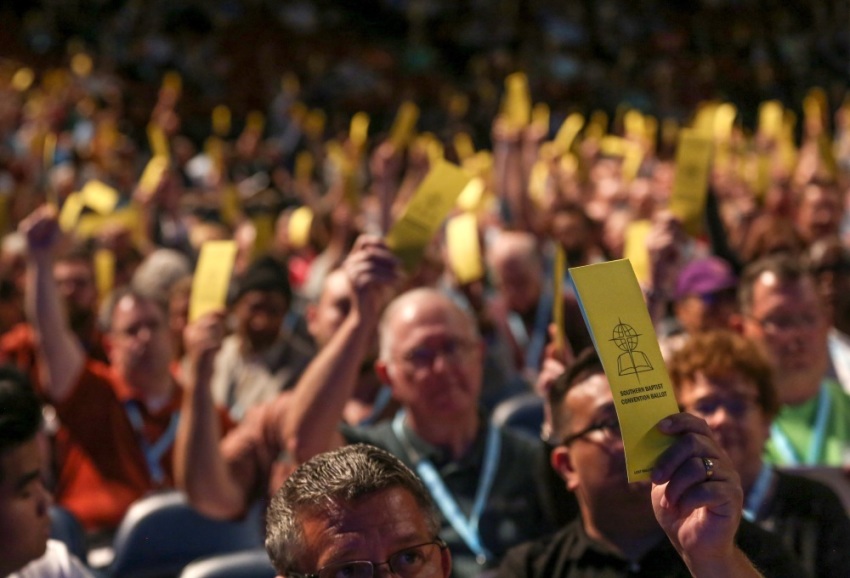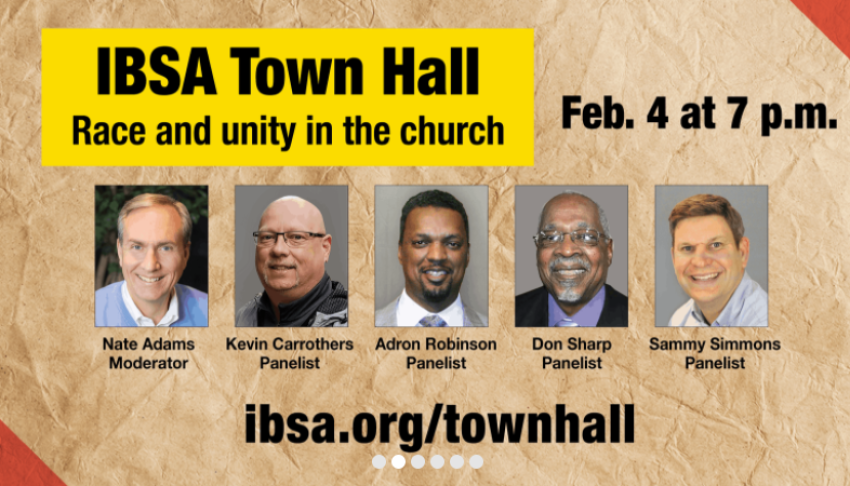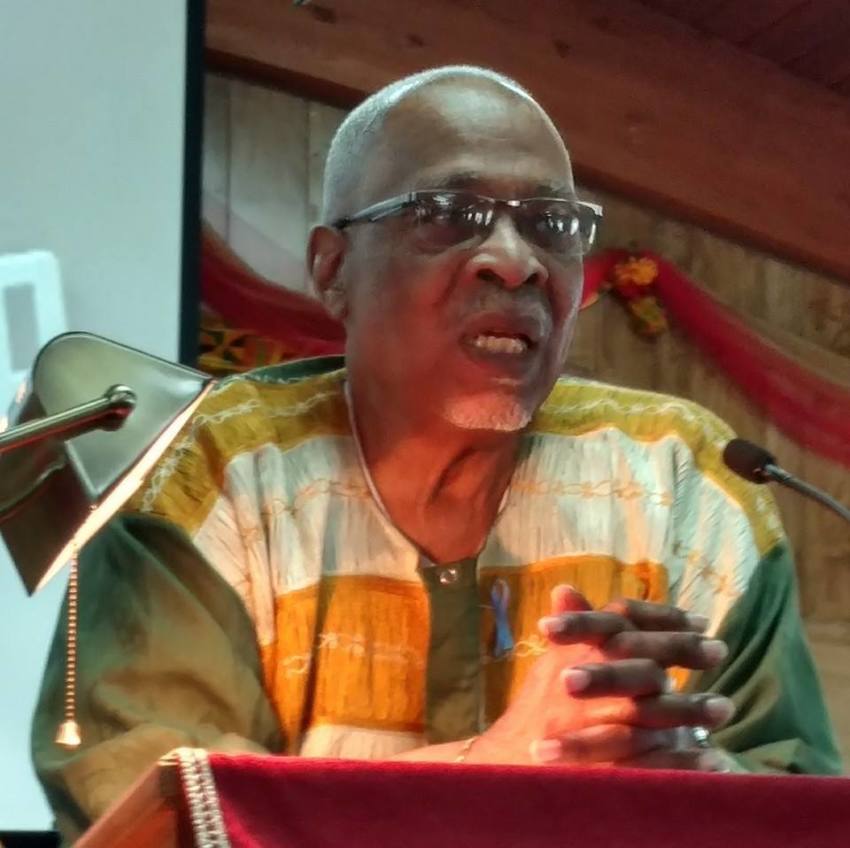It’s time for SBC leaders to take racial turmoil to God, Illinois pastors say

A group of black and white pastors from the Illinois Baptist State Association are calling for a return to the Bible and the setting aside of politics to help heal the racial divide in the Southern Baptist Convention that has erupted over politics and theology in recent months.
“I think the Southern Baptist Convention says a whole lot and has great statements out and has strong theology. I think the Convention needs to work more on what we call ‘doalogy’ — living out our faith, living out the great commandment. And the more we live out the great commandment, the more we’ll be conformed to the image of Christ and the more we will break down the man-made barriers and the demonic barriers that are between us,” said Adron Robinson, senior pastor of Hillcrest Baptist Church in Country Club Hills at a virtual town hall Thursday, moderated by IBSA Executive Director Nate Adams.
Robinson who is black, was one of three former presidents of the association, along with current leader, Pastor Sammy Simmons of Immanuel Baptist Church in Benton, who met to discuss ways in which America’s largest Protestant denomination could overcome the ongoing divide over race and critical race theory.
Simmons agreed that instead of creating more problems with resolutions, perhaps SBC leaders could focus more on practically working together.
“I’ve never liked resolutions. Maybe instead of statements, I just think we need substance. We need to work together,” he said. “Not only do we need minorities at the table, we need minorities to help us make the table,” he continued, referencing a comment made by another fellow Southern Baptist.

Along with tensions triggered by mass protests against racial injustice and police brutality in 2020, a decision made last year by the Council of Seminary Presidents, which is comprised of the SBC’s six seminaries, has sparked an exodus of black leaders from the denomination after they voted to reject critical race theory and deemed it as incompatible with their faith while condemning “racism in any form.”
There now appears to be an impasse over the issue that could likely contribute to more black pastors and their congregations cutting ties with the SBC if Resolution 9, which describes critical race theory as an analytical tool that can “aid in evaluating a variety of human experiences,” is rescinded at the SBC’s annual meeting this summer.
The pastors, whose churches are part of the IBSA partnership of nearly 1,000 SBC-affiliated churches, church plants and mission congregations working together to advance the Gospel in Illinois and around the world, all raised concern over the ongoing tensions.
“This sort of national cultural discussion that’s already so grieved and volatile have also entered the controversial subjects of critical race theory and intersectionality, and I wrote in my column, ‘a year ago I couldn’t have told you what those were and I suspect most church members and even pastors would need to look them up to have their first orientation to them, and yet they’re becoming more common in our conversation and for some, these theories risk becoming an ideological wedge which can threaten our larger unity and cooperation and the priorities of our common ground,’” said Adams.

The Rev. Donald Sharp of Faith Tabernacle Baptist Church in Chicago, who was the first African American elected as the president of the IBSA in 1983, stressed that the SBC is “not a monolithic group, no more than the black church is not a monolithic group,” and “everybody is not moving in lockstep with each other.”
He also suggested that politics, and not Christ, has been a big driver behind some of the tensions.
“We’ve got to deal with some very hard, hard issues. The reality is that much of the politics has bled over into the pews of our churches, and it’s also mitigated and created a lot of problems that otherwise have gotten in the way of us being able to communicate with each other more openly, because of the politics of the country over the last four years,” he said.
Robinson lamented that black churches have felt abandoned by their white brothers and sisters in the struggle against racism.
“The New Testament writers constantly tell us we are to have compassion for one another, bear one another’s burdens, love one another, be gracious to one another. And oftentimes, the black church doesn’t feel like the rest of the church community in America helps to or at least share our burden and have compassion for our brothers and sisters,” he said.
The pastors shared a variety of reactions to the protests over police brutality and systemic racism last summer, and Kevin Carrothers, associational mission strategist for the Salem South Association since 2017, said he sometimes feels helpless even though he agrees that white Christians need to show more empathy.
“I appreciate what brother Adron said about the one anothers. And I was thinking about when Paul talks about in that letter to the Corinthians, one member of the family grieves, we all should grieve. And we share that burden together. I’ll just speak personally. I think sometimes when those issues arise and we’re confronted, there is a sense of helplessness from my perspective because I don’t know what to do,” he said. “I don’t know how to influence change. I don’t have that role to …. [make] changes [to] the systems and the organizations or structures.”
Simmons, who said his community is predominantly white, admitted that there are things members of his church community also don’t understand.
“My town is 96% white and less than 1% African American, and so it raises lots of questions. For us, that was individual conversations, but we don’t understand the same things because we live in totally different contexts. I guess it’s a little bit quite different in Benton than it is in Chicago,” he said.
Pastor Sharp said the George Floyd protests triggered anger in his Chicago congregation.
“Well of course, the first word is anger. Anger frustration, and when it’s gonna ever end,” he said. “What it does for our congregation, it just reinforces history, past pains, past histories. I grew up in Chicago. I remember as a boy going down to Roberts Temple Church of God in Christ on a hot August day and seeing the body of Emmett Till. And it just raised even more pain and raising the question, ‘when it’s gonna ever end?’”
On Aug. 28, 1955, 14-year-old Emmett Till, an African American from Chicago, was brutally murdered for allegedly flirting with a white woman four days earlier while visiting family in Money, Mississippi.
“I think it hit different congregations differently. Like Pastor Sharp said, the long line of historic events in this vein has caused us to get angry that it’s still going on,” Robinson said. “Here it is in 2020 or even 2021, and black lives are still devalued on a regular basis in America. It causes frustration but also causes us to focus in on God because we know that God is where justice comes from. God is where our value comes from. God is where our love comes from. And so we look to the Kingdom to do what our government does not do. So there’s always pain, there’s always hurt. But within that pain and hurt we always take it to God,” Robinson said.
And Robinson believes now is the time for Southern Baptists to come together and take things to God.
“Pastors have to be intentional to disciple out racism. Racism is a sin like any other sin. The Gospel is the only cure for sin, and so pastors have to be intentional about discipling out racism. Teaching people what the Bible says — that there’s only one race the human race, that all humans are created in the image of God. And then not letting the cultural influences bleed into the church and not be challenged by the truth of the Gospel," Robinson said.
"It’s OK for them to come in with those ideas because they come from the world. You should come with worldly ideas. The churches got to disciple them into the truth with a relationship with God,” he added.



























